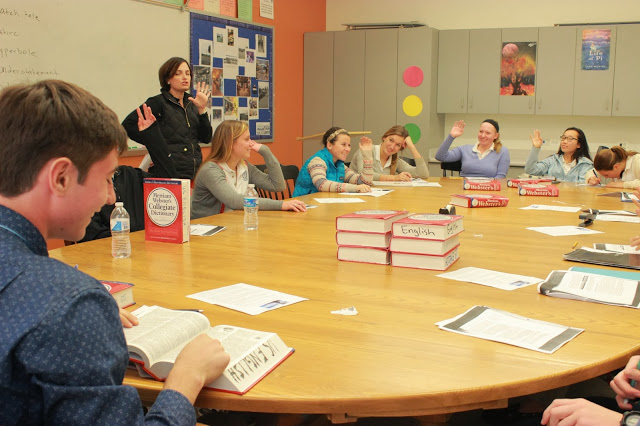Katie O’Reilly ’14: In a private secondary educational setting, the value of class participation is undeniably the most important takeaway to carry over into professional achievement.
The first day on the job, fresh out of a prestigious collegiate institution, one should not expect to be given a multiple-choice question, a fill in the blank worksheet, or the definition of some useless vocabulary word. In reality, on the job it will be more useful to have actually developed and ultimately mastered critical thinking, listening and speaking skills that are almost entirely essential to career success, and the ability to join a discipline’s conversation.
Grasping such skills ensures optimal success in the professional world. Students and teachers alike therefore must understand that individual contribution in a class creates this well-rounded mind. “…Class should be about dialogue between the teacher and the students but also among the students themselves,” noted Kris Aldridge of the History Department. That student conversation shows that you are present in the course and engaged in the material. “Part of learning to think and part of developing the skills that you need for life includes contributing to that dialogue,” added Aldridge.
Class participation should naturally be a contributing factor to a student’s final grade within all academic disciplines. Although less formal, contribution in a class period is equivalent in value to written composition and testing scores. That kind of involvement demonstrates this incredibly unique combination of a courageous and intelligent student, which ultimately yields a dynamic individual who succeeds outside of a classroom setting.

Photo courtesy of Leigh Adelizzi ’15
Obviously not every student is necessarily willing to challenge his or her classmates or teachers in this kind of environment, which could lead to a less than pleasant class participation grade. But these otherwise quiet students must push themselves outside their comfort zones and learn to verbalize and manipulate the material in their own voice. Some of the students who participate the most during a period may not also be those with the highest testing scores. They are challenged to perform outside their comfort zones, just as a shy student must be challenged to speak. Thus it is only fair to have this grading balance to encourage the necessity of a well-rounded student, where students are valued as more than a number based upon results. “This is the value of effort and engagement, are you asking questions, are you answering questions, are you participating…” noted Helena Cochrane of the Modern Language Department.
Certainly one can score high on tests, but frankly if one fails to put those ideas and knowledge into words it diminishes his or her intelligence by lacking proper communication and speaking skills. “It is very disheartening as a teacher to read sophisticated and well expressed ideas in an essay from a student who never shares those ideas with his or her classmates,” noted Aldridge. It is a shame if a bright thinker keeps that knowledge and insight to themselves and ultimately fails to engage in the material at the next level. Truthfully, we just can’t have the best and brightest minds in the class not speaking.
In both educational and working settings, communication is the essence of prosperity. And that is ultimately what class participation highlights: a engagement between instructors and students.
Episcopal is responsible for preparing the students to develop for the next step in life, and honestly class participation generates skills and an important level of ownership that test-taking just simply doesn’t cover.